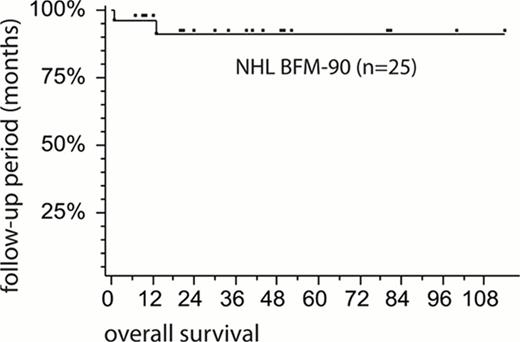Abstract
Abstract 4419
ALK-Positive Anaplastic Large Cell Lymphoma (ALCL ALK+) represent 5–15% of all non-Hodgkin in children and 5% in adults and characterized by the specific chromosome translocations, which lead to the break of gene ALK. Currently describe 9 translocations. All of them have no prognostic significance.
We present a case of ALCL ALK+ with a new chromosomal rearrangement involving locus gene 2p23 and poor response to therapy.
Case presentation. A 24-year old woman presented to our clinic with a month history of right axillar tumor 20×9 sm. Full examination reveals B-symptoms, the involvement of the mammary gland, generalized lymphadenopathy and splenomegaly.
The diagnosis ALCL ALK+ was made on the base of CD30 and ALK expression and ALK gene rearrangement. Cytogenetic analysis showed a normal karyotype including a new translocation t(2;8)(p23;q22). In our centre we provided the pilot study of the efficacy of the protocol NHL BFM-90 in adult ALCL ALK+. Overall five-year survival rate is 90%±6% (n=25).
The patient was treated according to the program, branch K3 (6 cycles AA-BB-C-AA-BB-C, the dose of methotrexate 5 g/m2). The remission was achieved after 4 cycle. CNS prophylaxis was made in the first cycle of the chemotherapy (intrathecal administration of methotrexate 15 mg, cytarabine 30 mg and dexamethasone 4 mg).
A weak after the last cycle of the chemotherapy the patient complained of intensive headache. Neuroleukemia was diagnosed (100 cells in μl large anaplastic cells expressed CD30, ALK, and have ALK rearrangement). Full examination revealed no other tumor lesions. The patient was treated with 10 intrathecal administration of methotrexate, ara-C and dexamethasone. The normalization of the cerebrospinal fluid was after the 7th lumbar puncture. Currently the patient is treated following chemotherapy program for relapsed lymphomas.
we presented a case of primary progressive course of ALCL ALK+ with a new chromosomal rearrangement t(2;8)(p23;q22). To the best of our knowledge and after literature search this appears to be a new cytogenetic abnormality in ALCL ALK+. It was the first case of progression of ALCL ALK+ on the intensive program NHL BFM-90 in adults in our experience. So we propose that this translocation may be associated with unfavorable prognosis. Further trials and study of pathogenesis of t(2;8)(p23;q22) to confirm our observation.
No relevant conflicts of interest to declare.
Author notes
Asterisk with author names denotes non-ASH members.



This feature is available to Subscribers Only
Sign In or Create an Account Close Modal